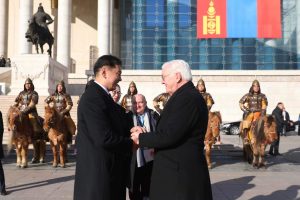This year marks the 50th anniversary of Mongolia and Germany’s establishment of diplomatic relations. To celebrate the occasion, from February 7-8, German President Frank-Walter Steinmeier paid a state visit to Mongolia at the invitation of his counterpart, Mongolian President Khurelsukh Ukhnaa. Steinmeier was accompanied by his spouse, Elke Büdenbender, and a delegation including Minister of State at the Federal Foreign Office Tobias Lindner.
During the visit, Ulaanbaatar and Berlin upgraded their bilateral ties to a strategic partnership. The newly established strategic partnership opens new avenues of cooperation in a variety of sectors, with political, economic, and foreign policy implications.
The Mongolian People’s Republic and the German Democratic Republic established official diplomatic relations on January 31, 1974. Since then, Germany has been a robust supporter of Mongolia’s democratization, development, and social welfare. Germany was among the major Western donors who provided financial assistance to Mongolia during the economic collapse in the early 1990s.
Berlin has established strong bilateral ties with Ulaanbaatar in a wide range of sectors, even predating formal diplomatic relations. As early as the 1920s and 1930s, German scientists showed research interest in Mongolia’s equestrian and nomadic society. Mongolia’s interest in strengthening relations with Germany continued throughout the Cold War era. During Tsedenbal Yumjaa’s era – who held power for 40 years – he visited Berlin in 1957, 1969, and 1977. In 1989, Mongolia’s new prime minister, Batmunkh Jamba, continued Mongolia’s foreign policy engagement with Berlin.
Since establishing diplomatic relations, Germany has continued to play an important role in Mongolia’s development as one of Ulaanbaatar’s leading European partners. The 2008 joint declaration of a comprehensive partnership opened avenues of cooperation in education, pharmaceuticals, science, and exploration.
Steinmeier’s state visit to Mongolia brought the signing of a strategic partnership agreement, a geopolitical move that includes economic and political components. The new strategic partnership is carrying Germany-Mongolia relations beyond the traditional framework of cooperation into mutual support on the international stage – something that is especially important for Germany.
In 2011, former Chancellor of Germany Angela Merkel paid a state visit to Mongolia, marking the first visit of a German head of government to Ulaanbaatar. During her trip, securing a rare mineral deal with the Mongolian government was at the top of her agenda. This also carried technological benefits for Mongolia’s extractive industry as the German side would provide techniques and technological assistance in exploring rare minerals.
In 2022, when Mongolian Prime Minister Oyun-Erdene Luvsannamsrai paid an official visit to Berlin, German Prime Minister Olaf Scholz continued Merkel’s agenda for raw materials and mineral extraction.
The newly signed strategic partnership, too, advances “cooperation in natural resources, industry, and technology, as well as their continued support for the German-Mongolian Institute for Resources and Technology, a joint flagship project under the aforementioned Agreement.” Germany’s advanced industrial technology could be a game changer for Mongolia’s extractive sector.
That said, the newly established strategic partnership aims to expand the scope of the partnership beyond Mongolia’s mineral wealth to include pressing issues such as diversifying Mongolia’s energy source, development of renewable energy, and climate change-related development projects. The newly established strategic partnership envisages deeper economic ties, particularly allocating financial assistance funds toward projects within Vision 2050, Mongolia’s long-term development strategy and its goals.
For Mongolia, Germany’s investments in renewable energy, and improving technologies are crucial. Germany agreed to provide 300 billion tugrik (around $90 million) to Mongolia’s development projects. Khurelsukh highlighted Germany’s contribution of these funds, which will be utilized in “sustainable economic development, employment, energy transition, mitigation of climate change, conservation of natural resources, and the successful implementation of the ‘One Billion Trees’ National Campaign.”
Germany has already established several development programs in Mongolia, such as Deutsche Gesellschaft für Internationale Zusammenarbeit (GIZ) works in biodiversity, sustainable economic development, and energy efficiency programs. These programs serve as a crucial foundation for Mongolia to attract development funds, financial and technical assistance from Germany.
On the foreign policy front, Berlin needs Mongolia’s support for its ambition to receive permanent seat on the United Nations Security Council (UNSC). According to the joint declaration, Mongolia offered its “full support for Germany’s aspirations” in that regard. In return, Berlin agreed to support Mongolia’s feminist foreign policy endeavors on the international stage.
Both countries will work together to “advocate the values of democracy, the rule of law, transparency, good governance, democratic parliamentarian institutions and civil society.” The newly established strategic partnership also included cooperation components to strengthen Mongolia’s judicial system.
Germany has already established multiple research centers in Ulaanbaatar that observe and analyze Mongolia’s justice, legal system, and governance. German political foundations (like Konrad-Adenauer-Stiftung, Friedrich-Ebert-Stiftung, and Hanns Seidel Foundation) contribute a tremendous amount of research in contemporary Mongolia.
During a joint press conference, Khurelsukh highlighted Germany as the first European Union country to establish a strategic partnership with Mongolia. Indeed, Steinmeier’s state visit to Ulaanbaatar not only brought a significant upgrade to Germany-Mongolia ties but elevated Mongolia’s foreign relations with Europe more broadly.
The new Germany-Mongolia strategic partnership carries entail geopolitical implications on both ends. Germany, being a major power within the European Union, can assist Ulaanbaatar’s economic pursuits with EU members. For Germany, Mongolia’s democratic governance and its critical minerals are of great importance. Moreover, the ongoing uranium exploration deal between France and Mongolia shows that Germany is not alone within the EU in seeing strategic significance in Mongolia.
































